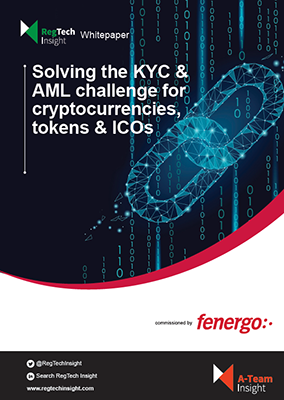
Solving the KYC & AML Challenge for Cryptocurrencies, Tokens & ICOs
The cryptocurrency market is at an inflection point. It has gained substantial momentum from early investors (private & retail), day traders and prop shops but it has so far failed to get substantive engagement from wider institutional players.
The crypto marketplace today is a mix of exchange and OTC-traded activity with little of the market infrastructure that institutional players rely on in other asset markets. There are many types of cryptocurrency, each with its own characteristics. These are traded on many exchanges, each with its own trading rules. There is little in the way of risk protections; no custodians, little to no regulation, and – crucially – few protections around the identity of clients and counterparties: no KYC in many cases.
As a result of this lack of transparency, there are understandable concerns surrounding the source, usage and ultimate destination of crypto funds – which are inevitably deterring institutional participation, subject as these firms are to highly evolved and rigorous regulation.
Addressing this barrier to growth, and fixing the transparency issues around crypto, could unleash the sector as a legitimate asset class and unlock its potential to transform modern banking and finance across the globe.
But what will it take to reach this tipping point? What practical steps do financial services industry participants – and the authorities that regulate them – need to take to address crypto’s transparency issues in order to transform perceptions and bring it into the institutional mainstream?
This report assesses the current state of play for institutional investment in the cryptocurrency market, and the infrastructure now in place to support it. It discusses ongoing initiatives to lend credence to the burgeoning cryptocurrency market. And it suggests steps that can be taken to regulate, de-risk and decriminalise the crypto space by addressing its current KYC and AML challenges.
Download the white paper to:
- Identify the primary barriers to institutional participation in cryptocurrency;
- Establish the existing controls in place to monitor and regulate the crypto market;
- Examine the strengths and weaknesses of the current system and learn more about potential security issues;
- Compare regulatory approaches across multiple jurisdictions;
- Discover what the industry really thinks, through a comprehensive poll of over 400 leading institutional market participants conducted by Fenergo;
- Assess what future KYC/AML regulation could look like, prepare for regulatory changes, and position yourself to get ahead of the game.

